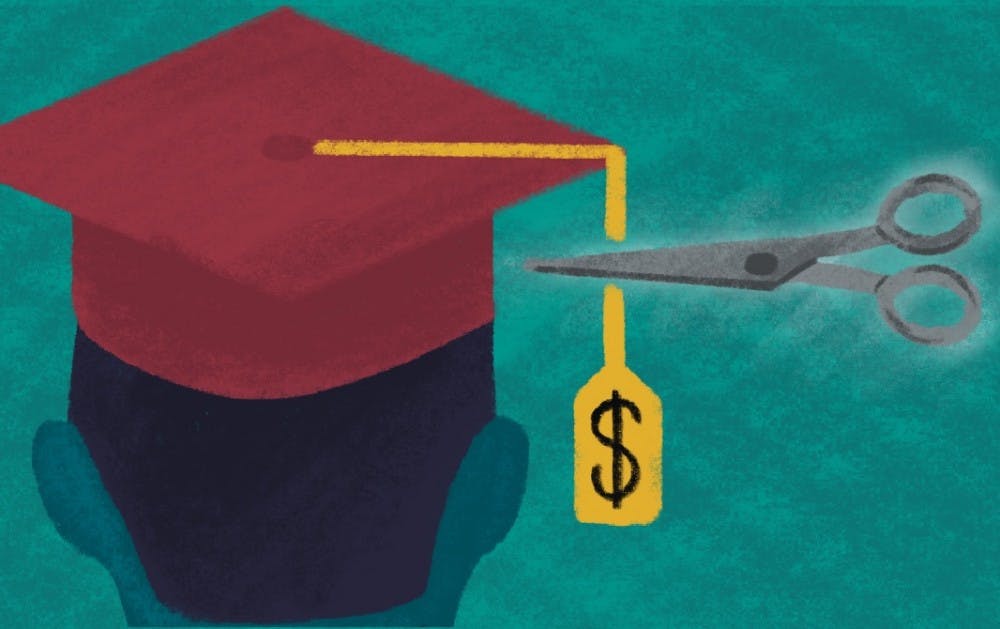For what it’s worth, although the United States is the global economic hegemony with the highest gross domestic product in the world, the U.S. does not have the best education system in the world.
Universal programs such as tuition-free higher education should be considered by the ASU community. These programs could easily be paid for with the tens of millions of dollars being made by the wealthiest percentile in this country. The wealth is there — what's needed is for it to be given to the poor for free education.
“The truth is that right now, students are being burdened with debt,” said Benjamin Fong, the faculty advisor for Young Democratic Socialists of America, “College is borderline unaffordable for a lot of people.”
READ MORE: Struggling ASU students do not have enough resources
In total, U.S. students are $1.52 trillion in debt. Students deserve a system where they don't have to worry about the capitalist system preying on young people who simply want to have a good education. That kind of system is one where the necessities of life are all free — including higher education.
"If college is only in the province of very rich kids, then that’s not providing the kind of equality of opportunity that Americans think of their society as providing," Fong said.
ASU does provide some degree of free tuition for certain students, such as the Starbucks College Achievement Plan — but this program only offers online classes and is only an example of corporate partners advertising themselves as a generous company to the public.
Importantly, this program isn't as free as it claims, as it mostly relies on reimbursement. Recipients of this program have to pay in advance and be reimbursed by the company after a certain amount of credits are completed. A truly generous company wouldn't operate a free tuition program on this basis.
Instead of offering meager concessions to the workers of ASU's partner company, a real tuition-free program would take the profits of such a highly successful company and not make students pay for their students from the start.
After all, former Starbucks CEO Howard Schultz is a billionaire with a net worth of $4.2 billion. Even just 1/5th of Schultz's net worth could completely pay for the tuition of nearly 80,000 in-state students.
Meanwhile, that's just the net worth of only one person.
Nobody deserves to have so much wealth hoarded to themselves as students find themselves being financially and mentally drained by crippling debt. Free college is an issue of material struggle, millions of students can't find a way to make ends meet.
"Although I am on financial aid, I still struggle from the day to day cost of going to college," said Jake Phillip Morris, a junior studying earth and environmental studies. "The nickel and diming that ASU does makes college inaccessible."
The movement backing free college comes from the grassroots level, it comes from working-class people who are left behind as the rich get richer and the poor get poorer.
"I’m having to drop out due to the stress of working two jobs and going to school," said Reece Thompson, a sophomore studying computer science. "A major part of the issues have been due to tuition."
It's important for students to advocate for solutions that are often claimed to be unrealistic. Just because these solutions are radical, however, does not mean they are impossible.
The ASU community should recognize that the only solution to this growing inequality is to assure the wealth from those richest Americans is used for social programs that can go directly towards funding the future of all those who wish to pursue higher education.
Reach the columnist at amisais@asu.edu or follow @comradealexia on Twitter.
Editor’s note: The opinions presented in this column are the author’s and do not imply any endorsement from The State Press or its editors.
Want to join the conversation? Send an email to opiniondesk.statepress@gmail.com. Keep letters under 500 words and be sure to include your university affiliation. Anonymity will not be granted.
Like The State Press on Facebook and follow @statepress on Twitter.




